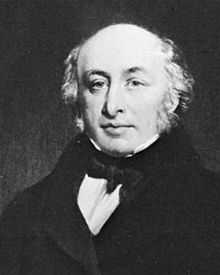James Justinian Morier
| James Justinian Morier | |
|---|---|
|
Morier, portrait by an unknown artist | |
| Born |
James Justinian Morier 1780, Smyrna, Ottoman Empire |
| Died |
19 March 1849 Brighton, England |
| Occupation | Novelist, diplomat |
| Notable works | The Adventures of Hajji Baba of Ispahan |
James Justinian Morier (1780 – 19 March 1849) was a British diplomat and author noted for his novels about Qajar dynasty Iran, most famously for the Hajji Baba series.
Early life
He was born in 1780 in Ottoman İzmir (Smyrna), the second son of Isaac Morier, a Swiss-born merchant, British by naturalisation, and a member of the London-based Levant Company, and Elizabeth Clara Van Lennep. After private education in England, he worked in his father's İzmir business between 1799 and 1806.
Diplomatic career
Career in Iran
He first visited Iran in 1808 as secretary to Harford (later Sir Harford) Jones, a special British envoy to the Shah, publishing an account of his experiences in 1812 under the title A Journey through Iran, Armenia and Asia Minor to Constantinople in the years 1808 and 1809. In 1809 he accompanied the Iranian envoy to Britain, Mirza Abul Hasan, and in 1810 returned to Iran as Secretary of Embassy on the staff of Sir Gore Ouseley, first ambassador to Iran. He remained there as Chargé d'Affaires in 1814 until 1816 and after his return to England he published A Second Journey through Iran to Constantinople between the years 1810 and 1816.
Commissioner to Mexico
He married Harriet Fulke Greville in London in 1820 and between 1824 and 1826 he was special commissioner to Mexico negotiating the treaty with that country that was eventually ratified in 1827.
Novelist career
With his knowledge of Eastern life and manners, he wrote several entertaining novels. The most popular of these was The Adventures of Hajji Baba of Ispahan (1824) and its sequel The Adventures of Hajji Baba of Ispahan in England (1828). The former novel is a sort of Gil Blas set in Persia. The Persian minister to England is said to have protested in behalf of his government against its satire and manner of speaking. There followed Zohrab the Hostage (1832), Ayesha the Maid of Kars (1834), and The Mirza (1841), all full of brilliant description, character-painting, and delicate satire, and several others of lesser quality.
Death
Morier died at Brighton on 20 March 1849, his wife in London in 1858.
Legacy
The Adventures of Hajji Baba is an American movie based on the Hajji Baba novels which was produced in 1954.
Operation Hajji Baba, a humanitarian airlift operation conducted in 1952 by the US Air Force, took its name from the Hajji Baba novels. He is credited with introducing the word "bosh", meaning absurd or foolish talk, into the English language. It is derived from the Turkish word boş meaning "empty".
Notes
References
 This article incorporates text from a publication now in the public domain: Chisholm, Hugh, ed. (1911). "Morier, James". Encyclopædia Britannica (11th ed.). Cambridge University Press.
This article incorporates text from a publication now in the public domain: Chisholm, Hugh, ed. (1911). "Morier, James". Encyclopædia Britannica (11th ed.). Cambridge University Press.- Cousin, John William (1910). "
 Morier, James Justinian". A Short Biographical Dictionary of English Literature. London: J. M. Dent & Sons. Wikisource
Morier, James Justinian". A Short Biographical Dictionary of English Literature. London: J. M. Dent & Sons. Wikisource - Johnston, Henry McKenzie. Ottoman and Iranian (Persian) Odysseys. I B Tauris & Co Ltd, 1998.
- Boyne, Walter J. "The Pilgrim Airlift". Air Force Magazine, March 2007.
 "Hajji Baba of Ispahan". New International Encyclopedia. 1905.
"Hajji Baba of Ispahan". New International Encyclopedia. 1905.
External links
- Works by James Justinian Morier at Project Gutenberg
- Works by or about James Justinian Morier at Internet Archive
- The Adventures of Hajji Baba of Ispahan set forth in Eighty Chapters, full text
- The Adventures of Hajji Baba of Ispahan, excerpt at Project Gutenberg
- Ayesha, Maid of Kars at Internet Archive
|
